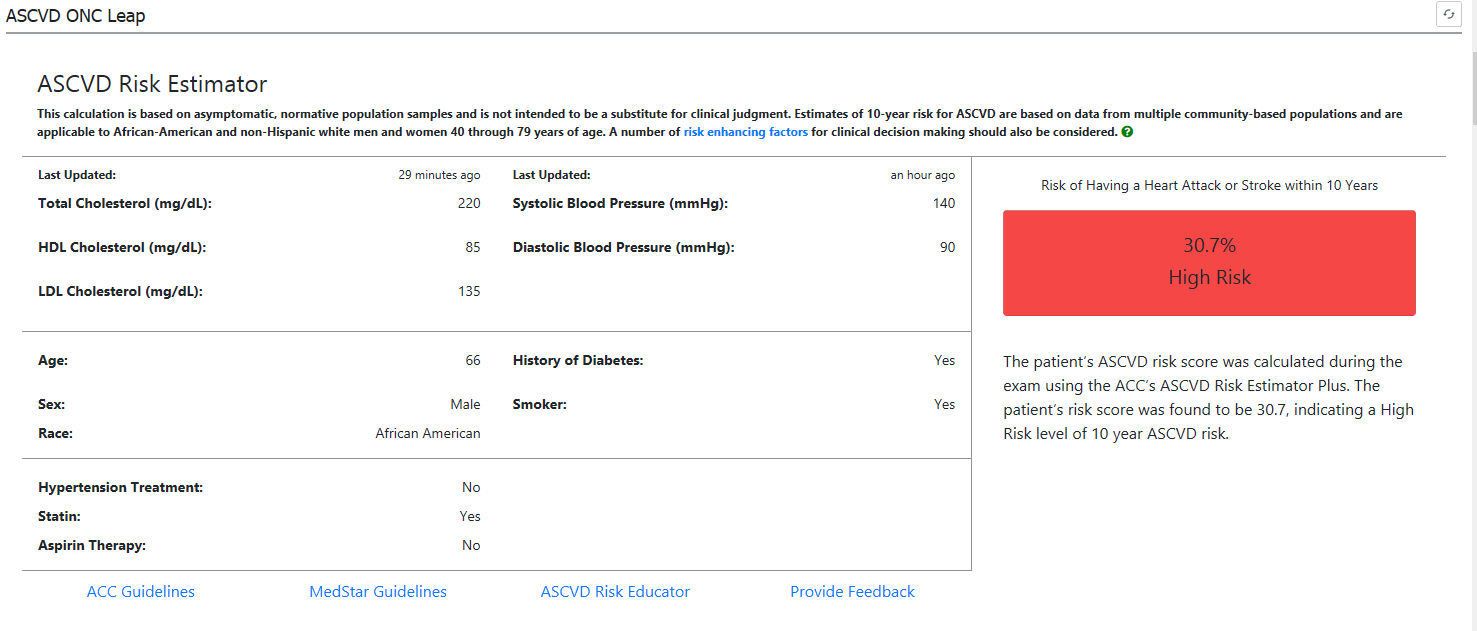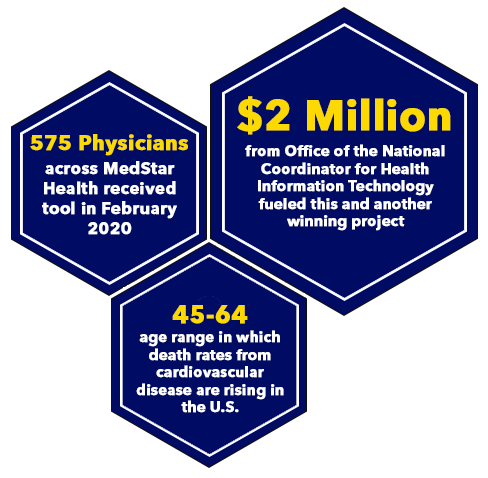Background
In November 2018, the MedStar Health National Center for Human Factors in Healthcare was awarded $2 million in combined cooperative agreement funding from the U.S. Department of Health and Human Services (HHS) Office of the National Coordinator (ONC) for Health Information Technology to accelerate health IT interoperability as part of the Leading Edge Acceleration Projects (LEAP) in Health IT opportunity.
Since that time, the MedStar Health human factors team has been working with Centra Health, CareJourney, Asymmetrik, MedStar Health’s electronic health record (EHR) vendor, a patient advocate, and many within the MedStar Health system to transform the stand-alone Million Hearts® risk calculator for heart disease, stroke, and cardiovascular disease into an active surveillance tool that physicians can use in the EHR system to streamline and improve patient care. Known more precisely as the Atherosclerotic Cardiovascular Disease (ASCVD) 10-Year Risk Calculator, the tool estimates the risk of having a heart attack or stroke within 10 years. American College of Cardiology and American Heart Association guidelines encourage U.S. doctors to use it to help guide treatment options for their patients. Considered the “gold standard” risk calculator, doctors originally needed to navigate to the ASCVD Risk Estimator website and enter patient information into this stand-alone tool to use it. Furthermore, if they wanted to show how specific lifestyle choices might impact that risk over time, they may choose to use yet another separate application or patient education materials.
Idea
Since many EHRs don’t include a risk estimator or don’t do so prominently, MedStar Health has developed a heart risk calculator application (app) in the EHR that doctors can use to access the ASCVD Risk Estimator, document risk, and teach their patients how to lower risk. The MedStar Health heart risk calculator app has two components: The ASCVD Risk Estimator, a clinician-facing tool, and the ASCVD Risk Educator, a patient education tool.
This video shows both components through an example of a patient who is high-risk for having a heart attack or stroke within 10 years.

Interfacing with a patient’s chart, the “Risk Estimator” component of the app auto-populates with the relevant lab values and patient information, generating a 10-year ASCVD risk score. Before the app, a doctor would have to search for each data point in the EHR then use an online calculator or mobile app to access the estimator. The cumbersome process of going back and forth between the patient chart and the calculator increased clinician burden and introduced the risk for errors. All information in this new MedStar Health tool is pre-populated, which is a major advancement and time-saver and strives to reduce clinician burden and risk for errors through integration into clinical workflow.
Here’s a snapshot of the benefits of MedStar Health’s heart risk calculator Risk Estimator:
-
Calculate and recalculate scores: Patient data are auto-populated from the EHR, pulling in the most recent and relevant values. Scores that are unable to be calculated are visually flagged.
-
Date stamps: Lab values are time-stamped with the date of data capture and are viewable through a hover function.
-
Documentation: A summary relating to the patient’s displayed risk score is produced and can be copied and pasted anywhere in the doctor’s EHR note.
-
Link to clinical guidelines: This tool also links to the American College of Cardiology and MedStar Health clinical guidelines for managing cardiovascular risk at the bottom of the display.
The doctor can then use the “Risk Educator” component of MedStar Health’s heart risk calculator to help patients understand what to do about their risk. In this video example, getting the patient’s blood pressure into the normal range drops the estimated risk from 30.7% to 24.2%. Improving cholesterol with some dietary changes might not have a significant impact, but preventing diabetes makes a huge difference in the estimated risk. Overall, this aspect of the tool allows the clinician to manipulate auto-populated patient data to calculate and recalculate risk scores for the purpose of patient education, inviting the patient to watch the dynamic process in the EHR.
Impact
In February 2020, during American Heart Month, an estimated 575 cardiology, primary care, family medicine, and endocrinology doctors across the MedStar Health system introduced the heart risk calculator to patients. The application enabled doctors to more easily show patients their personal risk for heart disease, stroke, and other cardiovascular diseases over time, as well as lifestyle choices that can improve heart health, using easy-to-read graphics.
In parallel, MedStar Health’s human factors experts evaluated the effectiveness of the new application in improving care, processes, and outcomes, and further optimized the tool as insights were gathered. These experts also explored the potential for other healthcare platforms and providers nationwide to begin using the heart risk calculator. This possibility to scale nationally was fueled by the MedStar Health Human Factors Center’s growing capabilities in informatics and SMART on FHIR app development, which are complemented by the team’s foundation in human factors and commitment to designing tools for and with end users.
Additionally, within MedStar Health, the human factors team explored the case and approach for developing further educational materials that patients could take home.
July 2021 Update
The Million Hearts® tool developed through the 2018 ONC LEAP award has been integrated into the MedStar Health EHR since February 2020. It has been available to an estimated 575 attending physicians in primary care, family medicine, cardiology, and endocrinology, as well as more than 1,500 residents.
During the research period spanning February to December 2020, MedStar Health clinicians generated an atherosclerotic cardiovascular disease (ASCVD) risk score via this calculator more than 320,000 times. They have also interacted with the ASCVD risk education tool more than 2,000 times, as well as the guidelines more than 485 times.
Looking beyond MedStar Heath, the tool’s source code and implementation information are now available on the ONC GitHub page thanks to this project. The team reports receiving interest in it from around the world and is hopeful other healthcare systems and providers will use it.
While this research effort has concluded, the team believes future studies could focus on assessing any related patient health outcomes, and exploring if the tool can help identify patients at risk for ASCVD even if they are not showing traditional signs of it.
Resources
Websites
-
Million Hearts® Centers for Disease Control initiative
News
-
MedStar Health Research Institute Newsroom, “MedStar Health Awarded HHS ONC Funding to Advance Health IT and Clinical Knowledge at the Point of Care” (November 2, 2018)
-
MedStar Health Newsroom, “MedStar Health launches new interactive heart risk calculator in patient electronic health record” (February 26, 2020)
-
MedStar Institute for Innovation Newsroom, “MedStar Health launches first patient-facing, interactive EHR heart risk calculator" (February 26, 2020)
-
Becker’s Health IT & CIO Report, “MedStar launches EHR-based heart risk prediction tool” (February 26, 2020)
-
Fierce Healthcare, “HHS is seeking to open up patient data. MedStar Health says it's got tools to make those data useful” (March 9, 2020)
-
CareJourney blog, “Million Hearts: Tracking Cardiovascular Risk to Improve Population Heart Health” (June 4, 2020)
-
ONC Health IT Buzz, “‘Mobilizing a Million Hearts’ Through SMART on FHIR” (November 30, 2020)
Please note: Images on this page contain fictitious patient data or are otherwise altered for confidentiality.
The overview above reflects work completed while the MedStar Health National Center for Human Factors in Healthcare was part of the MedStar Institute for Innovation. In July 2020, the Human Factors Center transitioned to its new organizational home, MedStar Health Research Institute, and still remains a key collaborator of MI2. Visit the Human Factors Center website for the latest information on its work.
Page last updated: 7/1/21
Page first published: 2/25/20
Summary
The team created a tool to provide personalized, interactive heart risk information in patient electronic health records.
Team
MedStar Health National Center for Human Factors in Healthcare
Status
Concluded











